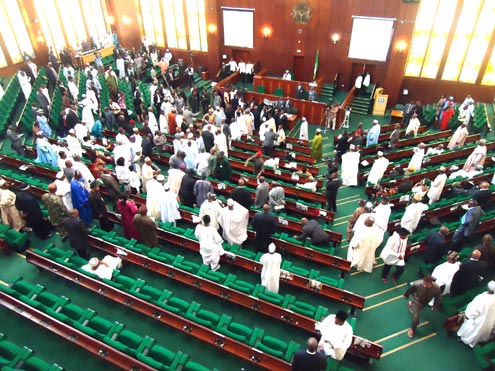This post has already been read 2214 times!
The House of Representatives has resolved to investigate the rising debt profile of Nigeria, especially with the conflicting figures issued by Vice-President Yemi Osinbajo and other government authorities.
The resolution was reached at the plenary on Thursday following the adoption of a motion moved by Mr Yusuf Tajudeen, entitled, ‘Need to Investigate Nigeria’s Alarming Debt.’
Granting the prayer of the motion, the House resolved to mandate the Committees on Aids, Loans and Debt Management, Capital Market and Institutions, and Banking and Currency to carry out an investigation into the matter and report back within four weeks for further legislative action.
Moving the motion, Tajudeen said, “The House notes with concern the alarming rise of Nigeria’s debt profile which has led to growing economic instability, stifled growth and stunted development, as well as impacting negatively on various sectors of the economy.
“There have been continued controversies about the true state of the nation’s debt profile, such that there is a glaring disparity in the figures given by the Federal Government and some fiscal policy monitoring organisations.
“While the Vice-President, Prof. Yemi Osibanjo, who is the Chairman of the Nigerian Economic Council, stated that the nation’s debt profile stood at $10bn in the last three years, the figures given by economic and budget experts as well as economic policy monitoring bodies ranged between $13bn and $47bn, from May 2015 to June 2018.
“Further analysis of Nigeria’s external and domestic debts reveals that the external debt grew to $17.83bn in June 2018 from $10.49bn in 2015, while domestic debt, which was N8.39tn in June 2015, has risen to N12.15tn as of June 2018, representing an increase of N7.6tn in three years.”
The lawmaker said the House was concerned that aside from the rising national debt profile, there was a sharp increase in sub-national borrowing in the last three years, such that the domestic debts of state governments rose from N1.69tn in June 2015 to N3.4tn in June 2018.
He noted that though external or domestic borrowing was an important and necessary strategy to reflate the economy and stimulate national growth and development, “the positive impact of Nigeria’s borrowings since June 2015 has yet to be seen.”
Tajudeen added, “Unlike global practices where borrowings are tied to specific projects mutually agreed by respective organs of the government, various borrowings by the Federal Government since June 2015 have not been transparent, a situation which gives room for doubts, misconception and prone to manipulations.
“Nigeria’s revenues are sharply declining, which makes it increasingly difficult to attract and sustain higher debts, ultimately portend micro and macro dangers to the national economy amidst numerous developmental challenges.”
Meanwhile, the Committee on Aids, Loans and Debt Management on Thursday recommended that the House should approve that two states be paid N90bn while five contractors be paid N43.5bn.
The recommendations were contained in an interim report presented by the committee on the ‘Request for Establishment of a Promissory Notes Programme and Bond Issuance to Settle Inherited Local Debts and Contractual Obligations.’
The committee recommended “the issuance of promissory notes and bonds in the sum of N90, 236,461,031.08 as payment of refunds to the listed state governments for federal highway projects executed on behalf of the Federal Government.
“Taraba State Government, N22, 254,062,330.08; Delta State Government, N67, 982,398,701.28.”
The committee also recommended the House to “approve the issuance of promissory note programme and bonds in the sum of N43, 586,007,252.69 as payment to contractors.
“Setraco Nigeria Limited, N37,432,400,000; Bouygues Nigeria Limited, N4,636,815,486.20; Simidia S & I International Limited, N346,191,766.49; Hamdala Homes & Agency Limited, N210,600,000; and Lejmej Limited, N960,000,000.”
[Punch]



